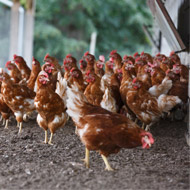New avian flu prevention zone in Wales

The current prevention zone requiring birds to be housed indoors to prevent avian influenza, is due to expire on 28 February.
A new Welsh prevention zone will be introduced at the end of February, requiring bird keepers to continue housing poultry and other captive birds indoors, or using other measures to separate them from wild birds.
Keepers will also be required to complete a self assessment of biosecurity measures at their premises under the new prevention zone, which runs from 28 February until 30 April.
The current prevention zone requiring birds to be housed indoors to prevent avian influenza, is due to expire on 28 February.
Last week Defra announced new proposals to allow birds outside from 28 February, assuming certain conditions are met and reasonable precautions are taken to prevent avian influenza. Similarly, the Scottish government revealed its intention to allow poultry and captive birds outside from 28 February on the condition that biosecurity is enhanced.
Lesley Griffiths, Welsh cabinet secretary for environment and rural affairs, said: “The risk of infection from wild birds is unlikely to decrease in the coming weeks. The changes I am announcing today are proportionate and place the onus on the keeper to select the best option for their circumstances to protect their birds. They must, however, ensure compliance with the additional risk mitigation measures.”
Chief veterinary officer for Wales, Christianne Glossop, added: “Keepers of poultry and other captive birds must remain vigilant for signs of disease. Avian influenza is a notifiable disease, and any suspicion should be reported immediately to the Animal and Plant Health Agency. Keepers should practice the highest levels of biosecurity if they are to minimise the risk of infection.
“I continue to strongly encourage all poultry keepers, even those with fewer than 50 birds, to provide their details to the Poultry Register. This will ensure they can be contacted immediately, via email or text update, in an avian disease outbreak enabling them to protect their flock at the earliest opportunity.”



 The latest
The latest